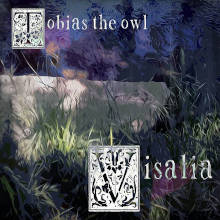The Graham Album Review #2024

Click on CD Cover for Audio Review in streaming mp3 format | |
Tobias the Owl: Visalia
by George Graham
(Independent release as broadcast on WVIA-FM 4/22/2020)

Click on CD Cover for Audio Review in streaming mp3 format | |
Tobias the Owl: Visalia
by George Graham
(Independent release as broadcast on WVIA-FM 4/22/2020)
Making music is almost always a collaborative process, with musicians working with each other in bands, combos, ensembles and orchestras. In a period when a pandemic has caused severe restrictions on getting groups of people together not only in an audience, but as a band, people are resorting to using technology to collaborate, or are working by themselves at home. And there has been a long history of musicians using the recording tools of the trade to make music by themselves, going back to Les Paul and his early overdubbing in the 1950, to artists like Mike Oldfield in the 1970s who created elaborate extended pieces though months of overdubbing using the analog equipment of the day.
These days, the proliferation of relatively inexpensive combination of laptops and music production software has enabled many musicians to create their own solo works, sometimes literally in their bedrooms.
And although the making of our album for this week predates the pandemic social distancing that marked the time of its release, it seems quite appropriate for its time. It’s the new third album by Tobias the Owl, called Visalia.
Tobias the Owl had previously been what is described as a “musical collective” from Seattle. The leader is Eljah Dhavvan. And their previous albums had been collaborative efforts, with a number of guest musicians. The new release, Visalia, is almost an entirely solo project, with all the instruments and vocals by Dhavvan, and in his liner notes, he said the album was recorded in his closet, a four-by-eight foot space in his Seattle loft. About the only outside contributions are some backing vocals.
Elijah Dhavvan has an interesting biography. An immigrant from Morocco, he became homeless dropout, hitchhiking across the US for some four years, before pursuing a medical education. During his first years in college, he lived in a tunnel underneath a building at the University of Texas at El Paso. He eventually became a physician and is now a professor of medicine at the University of Washington. The last Tobias the Owl album came about after Dhavvan was stricken by cancer, and wrote some 170 songs while in recovery. Meanwhile, his compositions have come to the attention of other artists and TV and film producers, who have used some of them in films. He has also done work as a voice actor on animated films, including one also featuring Star Trek’s William Shatner.
The new album features music that is somewhat folky at its core – and indeed Dhavvan has often performed as a solo artist – but the sound Visalia is decidedly atmospheric, and sometimes melancholy. He says that the songs address that difficult part of his life being homeless, which he says that until recently, he rarely talked about. But with that lyrical introspection comes a good sense of melody, with well constructed songs that bridge the gap between contemporary alternative and an old fashioned folky singer-songwriter record.
The fairly brief 32-minute album opens with a track that epitomizes the its folky-spacy sound. Ashes on the Ground evokes the 1990s in some of its textures. Though lyrics are about loss, the tune has a positive melodic sound. <<>>
The song called All My Love (Persephone) has a more contemplative sound with folk-style guitar picking at the base of the ethereal sonic texture. <<>>
Cadejo is a song about searching with an appropriately yearning-sounding musical setting. <<>>
The Things We Lose has a sound that evokes its lyrical motifs, set in a kind of folky waltz. <<>>
One of the more appealing tracks on the album, both musically and lyrically, is Seeds to the Wind. The arrangement keeps things fairly basic, to highlight the content of this well-crafted composition. <<>>
Another definite highlight of the album is Only in My Head which deftly combines a folky undercurrent with the atmospheric texture of the album. <<>>
The concluding track is called Sarasota, in which the Florida city forms the lyrical backdrop to this slightly melancholy love song. <<>>
Visalia, the new third release by Tobias the Owl, the musical project name of Seattle professor of medicine Elijah Dhavvan is, except for some backing vocalists, a totally solo release, unlike the previous Tobias the Owl projects, with Dhavvan playing all the instruments and recording it himself at home, in what he calls a “closet.” It’s a collection of high quality songs based on folk influence imbued with an atmospheric sound of ringing spacey guitars and mellow synthesizers. The result is pleasing music that skillfully combines two musical worlds, and is the kind of record that can reveal new details each time you hear it.
Our grade for audio quality is a “B.” The atmospheric sound is nicely accomplished without overdoing it or it turning into New Age music. But lead vocals are not cleanly recorded with some apparent intentional saturation distortion, which can spoil the otherwise warm sound. And of course, there is too much compression, squeezing out the dynamics of the performance.
At the time of the release of Visalia, the world was in a pandemic-imposed lockdown. Though the timing was purely coincidental, the album is a good example of the good things than can arise from one person working at home.
(c) Copyright 2020 George D. Graham. All rights reserved.
This review may not be copied to another Web site without written permission.
 To Index of Album Reviews | To George Graham's Home Page. | What's New on This Site.
To Index of Album Reviews | To George Graham's Home Page. | What's New on This Site.